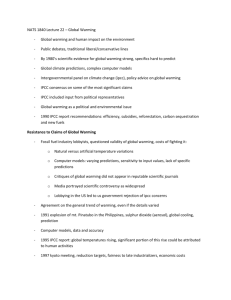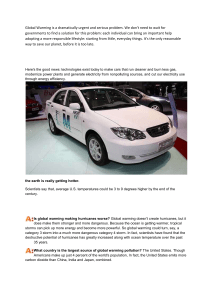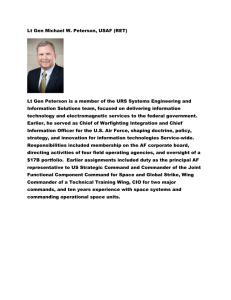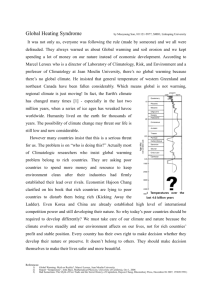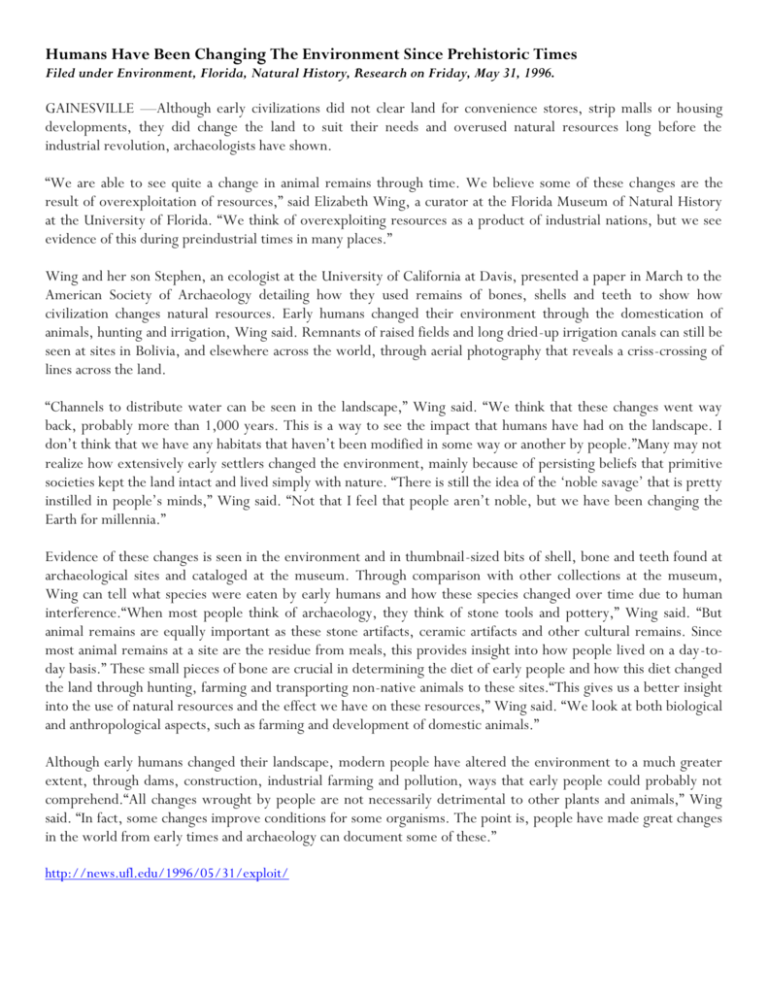
Humans Have Been Changing The Environment Since Prehistoric Times
Filed under Environment, Florida, Natural History, Research on Friday, May 31, 1996.
GAINESVILLE —Although early civilizations did not clear land for convenience stores, strip malls or housing
developments, they did change the land to suit their needs and overused natural resources long before the
industrial revolution, archaeologists have shown.
“We are able to see quite a change in animal remains through time. We believe some of these changes are the
result of overexploitation of resources,” said Elizabeth Wing, a curator at the Florida Museum of Natural History
at the University of Florida. “We think of overexploiting resources as a product of industrial nations, but we see
evidence of this during preindustrial times in many places.”
Wing and her son Stephen, an ecologist at the University of California at Davis, presented a paper in March to the
American Society of Archaeology detailing how they used remains of bones, shells and teeth to show how
civilization changes natural resources. Early humans changed their environment through the domestication of
animals, hunting and irrigation, Wing said. Remnants of raised fields and long dried-up irrigation canals can still be
seen at sites in Bolivia, and elsewhere across the world, through aerial photography that reveals a criss-crossing of
lines across the land.
“Channels to distribute water can be seen in the landscape,” Wing said. “We think that these changes went way
back, probably more than 1,000 years. This is a way to see the impact that humans have had on the landscape. I
don’t think that we have any habitats that haven’t been modified in some way or another by people.”Many may not
realize how extensively early settlers changed the environment, mainly because of persisting beliefs that primitive
societies kept the land intact and lived simply with nature. “There is still the idea of the ‘noble savage’ that is pretty
instilled in people’s minds,” Wing said. “Not that I feel that people aren’t noble, but we have been changing the
Earth for millennia.”
Evidence of these changes is seen in the environment and in thumbnail-sized bits of shell, bone and teeth found at
archaeological sites and cataloged at the museum. Through comparison with other collections at the museum,
Wing can tell what species were eaten by early humans and how these species changed over time due to human
interference.“When most people think of archaeology, they think of stone tools and pottery,” Wing said. “But
animal remains are equally important as these stone artifacts, ceramic artifacts and other cultural remains. Since
most animal remains at a site are the residue from meals, this provides insight into how people lived on a day-today basis.” These small pieces of bone are crucial in determining the diet of early people and how this diet changed
the land through hunting, farming and transporting non-native animals to these sites.“This gives us a better insight
into the use of natural resources and the effect we have on these resources,” Wing said. “We look at both biological
and anthropological aspects, such as farming and development of domestic animals.”
Although early humans changed their landscape, modern people have altered the environment to a much greater
extent, through dams, construction, industrial farming and pollution, ways that early people could probably not
comprehend.“All changes wrought by people are not necessarily detrimental to other plants and animals,” Wing
said. “In fact, some changes improve conditions for some organisms. The point is, people have made great changes
in the world from early times and archaeology can document some of these.”
http://news.ufl.edu/1996/05/31/exploit/
Questions
1. How did people in prehistoric times change the land to suit their needs and overused
natural resources? Cite examples from the article.
2. What did Ms. Wing say resulted from overexploitation of resources?
3. According to the article, the pieces of shell, bone and teeth found at archaeological
sites were crucial in determining what?
4. How have modern people altered the environment to a greater extent than early
humans?
4pm update
Humans blamed for climate change
Peter Walker and agencies
guardian.co.uk, Friday 2 February 2007 14.14 EST
A polar bear on a melting ice floe. Photograph: Getty Images
Global warming is "very likely" to have been caused by human activity, the most authoritative
global scientific body studying climate change said in a report today. The likelihood that the
phenomenon has been created by the burning of fossil fuels and other actions is greater than
90%, the Intergovernmental Panel on Climate Change (IPCC) concluded in its fourth report.
In 2001, the body - which brings together 2,500 scientists from more than 30 countries - said
global warming was only "likely", or 66% probable, to have been caused by humans. The study
said global warming is an "unequivocal" fact and likely to continue for centuries, warning of a
likely rise in world average temperatures of up to 4C.In comparison, the world is currently
around 5C warmer than during the last ice age. Environmental and science groups said the
report meant the main arguments on global warming were now effectively over.
"This day marks the removal from the debate over whether human action has anything to do
with climate change," Achim Steiner, the head of the UN environment programme, said.
Stephanie Tunmore, of Greenpeace, said. "If the last IPCC report was a wakeup call, this one
is a screaming siren."
The 21-page summary (pdf) of the findings, called Climate Change 2007: The Physical Science
Basis, was formally agreed by the IPCC in Paris yesterday and released earlier today.It steers
clear of policy recommendations, instead providing a rigorously scientific assessment of the
likely risks.The report predicts that global average temperatures would rise by between 1.1C
and 6.4C (2-11.5F) by 2100 - a slightly broader range than that shown in the 2001
figures.However, it said the best estimate was for increases of between 1.8C and 4C.
It forecasts a rise of between 18cm and 58cm in sea levels by the end of this century, a figure
that could increase by as much as 20cm if the recent melting of polar ice sheets
continues."Warming of the climate system is unequivocal, as is now evident from
observations of increases in global average air and ocean temperatures, widespread melting of
snow and ice, and rising global mean sea level," the summary said.The report said greenhouse
gases were already responsible for a series of existing problems, including fewer cold days,
hotter nights, intense heatwaves, floods and heavy rains, droughts and an increase in the
strength of hurricanes and tropical storms.
In a dramatic illustration of stronger storms, at least 14 people were killed as severe
thunderstorms and at least one tornado flattened homes and a church in Florida today.The
scale of such events in the 21st century "would very likely be larger than those observed during
the 20th century", the study said.It warned that, no matter how much humanity reduces
greenhouse gas emissions, global warming and sea level rises would continue for hundreds of
years."This is just not something you can stop. We're just going to have to live with it," coauthor Kevin Trenberth, the director of climate analysis for the US-based National Centre for
Atmospheric Research, said."We're creating a different planet. If you were to come up back in
100 years, we'll have a different climate."
The environment minister, David Miliband, today said the study's findings were "another nail
in the coffin of the climate change deniers"."What's now urgently needed is the international
political commitment to take action to avoid dangerous climate change," MrMiliband said.
The US president, George Bush, faced fresh criticism for his previous scepticism about the
scale of global warming and his refusal to sign up to the Kyoto protocol on greenhouse gas
emissions."Although President Bush just noticed that the earth is heating up, the American
public, every reputable scientist and other world leaders have long recognized that global
warming is real and it's serious," John Kerry, the Democratic senator who lost the 2004
presidential election to President Bush, said. "The time to act is now."
The White House issued a statement defending President Bush's record on climate change,
saying his administration had devoted almost £15bn to related science, technology,
international assistance and incentive programmes, "more money than any other country".
Some nation at the frontline of the effects of global warming said today that the IPCC report
showed it might already be too late."The question is, what can we do now? There's very little
we can do about arresting the process," Anote Tong, the president of Kiribati, a group of 33
Pacific coral atolls threatened by rising seas, said.
Bangladesh faces "increased level of drought, flooding and storms, especially in coastal belts,
salinity and loss of land," AinunNisshat, the country's representative on the International
Union for Conservation of Nature, said.
© 2012 Guardian News and Media Limited or its affiliated companies. All rights reserved.



